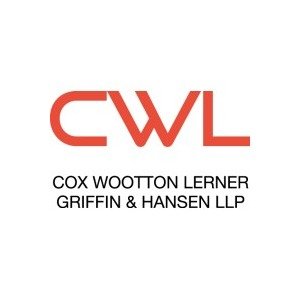Best Tax Increment Financing Lawyers in San Francisco
Share your needs with us, get contacted by law firms.
Free. Takes 2 min.
List of the best lawyers in San Francisco, United States
About Tax Increment Financing Law in San Francisco, United States
Tax Increment Financing (TIF) is a public financing method that San Francisco, like many other cities in the United States, uses to stimulate economic development in specific areas. It involves capturing future increases in property tax revenues generated from a defined area, which can then be reinvested into said area to support infrastructure improvements and other public projects. San Francisco utilizes TIF to encourage redevelopment in underdeveloped areas, aiming to stimulate economic growth, create jobs, and enhance public amenities.
Why You May Need a Lawyer
There are several situations where you may need legal assistance regarding Tax Increment Financing in San Francisco. If you're a developer looking to initiate a project reliant on TIF, navigating the complex application and approval process can require legal expertise. Property owners within a proposed TIF district might need legal advice on how TIF could impact property values or taxes. Additionally, municipalities may seek legal counsel to ensure compliance with TIF laws and regulations or to resolve potential disputes over TIF boundaries or funding allocations. Lawyers specializing in TIF can provide guidance on compliance, contracts, negotiations, and litigation if necessary.
Local Laws Overview
San Francisco’s local laws governing Tax Increment Financing are in place to ensure transparent and beneficial use of TIF. Key aspects include the requirement for a thorough economic analysis to justify the need for a TIF district, formal public hearings allowing for community input, and clear stipulations on how generated tax increments can be used. The city mandates that TIF projects contribute to affordable housing, infrastructure development, and other community priorities. Compliance with the California Redevelopment and Economic Development laws is required, emphasizing accountability and strategic planning.
Frequently Asked Questions
What is Tax Increment Financing?
Tax Increment Financing (TIF) is a financial tool that cities use to encourage development in specific areas by using future tax revenues to fund current improvements.
How does TIF benefit San Francisco?
TIF helps address blighted or underdeveloped areas by funding infrastructure projects and other public improvements, which can lead to increased investment, job creation, and community revitalization.
Who decides the boundaries of a TIF district?
City planners and local government officials typically identify and propose TIF district boundaries, which are then subject to public input and approval processes.
Can TIF increase my property taxes?
While establishing a TIF district does not directly increase property taxes, property values in redeveloped areas may rise, potentially impacting property assessments and taxes over time.
Is public input considered in TIF plans?
Yes, San Francisco requires public hearings and community meetings to gather input on proposed TIF plans and ensure they align with local needs and priorities.
What kinds of projects can TIF funds support?
TIF funds can support a variety of projects, including road improvements, public transportation enhancements, park development, and affordable housing initiatives.
Are there risks associated with TIF?
While TIF can drive development, there are risks, such as over-reliance on future tax revenues, potential displacement of residents, and unanticipated project costs.
Can TIF be used for residential projects?
Yes, TIF can support residential development, particularly if it includes affordable housing elements that address community needs.
How long does a TIF district last?
The lifespan of a TIF district can vary, but it typically lasts 20-30 years to ensure enough time for redevelopment and revenue generation.
How can I object to a proposed TIF district?
Individuals can voice objections during public hearings or through written feedback to relevant city departments handling TIF proposals.
Additional Resources
For additional information on Tax Increment Financing in San Francisco, you may contact the San Francisco Office of Economic and Workforce Development, the City Planning Department, or organizations such as the Urban Land Institute. These resources provide valuable insights and guidance on TIF-related matters.
Next Steps
If you need legal assistance in dealing with Tax Increment Financing in San Francisco, consider reaching out to a local attorney specializing in real estate, land use, or tax law. Engage them early in the process to navigate legal nuances effectively. You can also attend public meetings and workshops to better understand TIF projects and their implications. Lastly, remaining informed about current and proposed TIF districts will empower you to make informed decisions or voice your concerns effectively.
Lawzana helps you find the best lawyers and law firms in San Francisco through a curated and pre-screened list of qualified legal professionals. Our platform offers rankings and detailed profiles of attorneys and law firms, allowing you to compare based on practice areas, including Tax Increment Financing, experience, and client feedback.
Each profile includes a description of the firm's areas of practice, client reviews, team members and partners, year of establishment, spoken languages, office locations, contact information, social media presence, and any published articles or resources. Most firms on our platform speak English and are experienced in both local and international legal matters.
Get a quote from top-rated law firms in San Francisco, United States — quickly, securely, and without unnecessary hassle.
Disclaimer:
The information provided on this page is for general informational purposes only and does not constitute legal advice. While we strive to ensure the accuracy and relevance of the content, legal information may change over time, and interpretations of the law can vary. You should always consult with a qualified legal professional for advice specific to your situation.
We disclaim all liability for actions taken or not taken based on the content of this page. If you believe any information is incorrect or outdated, please contact us, and we will review and update it where appropriate.
















